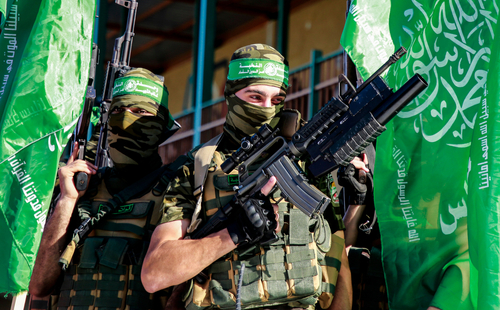
Israel delivered a devastating blow to Hamas leadership as Mohammed Sinwar, who controlled Israeli hostages and took over after his brother’s death, is reportedly killed in a precision airstrike beneath a Gaza hospital.
Key Takeaways
- Israeli forces conducted a targeted airstrike beneath the European Hospital in Khan Younis, reportedly killing Mohammed Sinwar, a senior Hamas figure who controlled Israeli hostages
- Mohammed Sinwar was the younger brother of former Gaza leader Yahya Sinwar, who was killed by the IDF in October, continuing Israel’s systematic dismantling of Hamas leadership
- Despite the IDF not officially confirming Sinwar’s death, Israeli Defense Minister expressed confidence in the operation’s success based on “all indications”
- Indirect ceasefire negotiations continue between Israel and Hamas in Doha, though progress remains limited as Israel maintains military pressure to secure the release of hostages
- President Trump’s administration supports Israel’s right to defend itself while regional Arab leaders call for an immediate end to military operations in Gaza
Targeted Strike Eliminates Key Hamas Commander
Israeli forces have executed a precision airstrike targeting a Hamas tunnel network beneath the European Hospital in Khan Younis, southern Gaza. Reports indicate the successful elimination of Mohammed Sinwar, a high-ranking Hamas commander who had taken control of operations following the death of his brother Yahya Sinwar in October. The younger Sinwar brother held significant power within Hamas, particularly over Israeli hostages captured during the October 7 attacks. This strategic strike represents another major blow to Hamas’s command structure as Israel continues its systematic dismantling of terrorist leadership.
The operation follows Israel’s successful elimination of Yahya Sinwar, the mastermind behind the October 7 attacks, and continues the aggressive counter-terrorism campaign launched under Operation Gideon Chariots. Reports also suggest another Sinwar family member, Zakaria Sinwar, was killed in a separate Israeli strike, further decimating the terrorist organization’s family-based leadership network. Mohammed Shabanah, Rafah Brigade commander and potential successor to Sinwar, was reportedly also eliminated, creating a significant leadership vacuum within Hamas’s military wing.
Israeli Officials Cautiously Confident While Awaiting Confirmation
Israeli Defense Minister Yoav Gallant expressed measured confidence in the operation’s success while acknowledging the need for definitive confirmation. “According to all the indications,” Gallant stated, suggesting strong evidence of Sinwar’s elimination while maintaining operational security by avoiding premature declarations. The IDF has maintained a cautious position, noting they “did not recognize” official confirmation of Sinwar’s death, as they await either their own intelligence verification or acknowledgment from Hamas. This careful approach reflects Israel’s commitment to operational precision and intelligence reliability.
If confirmed, the elimination of Mohammed Sinwar would represent a significant achievement in Israel’s counter-terrorism campaign and potentially reshape the ongoing hostage negotiations. Intelligence sources suggest that if Shabanah’s death is also confirmed, Az-adin-al-Hadad may become the next military head of Hamas, marking a significant transition in the organization’s leadership structure. These developments come as Israeli forces continue to target Hamas’s underground tunnel networks, which have been used to hide both terrorists and Israeli hostages.
Ceasefire Negotiations Continue Amid Intensified Military Operations
Despite the ongoing military operations, indirect negotiations between Israel and Hamas continue in Doha, mediated by Egypt and Qatar with American support. These talks aim to secure a ceasefire agreement and the release of remaining Israeli hostages held by Hamas since October 7. Prime Minister Netanyahu has maintained that Israel’s primary objectives remain the destruction of Hamas’s military capabilities and the return of all hostages. The Trump administration has consistently supported Israel’s right to defend itself while encouraging diplomatic efforts to secure the hostages’ release.
“We have to tell the Israeli government ‘that’s enough,” said Italian Foreign Minister Antonio Tajani.
Israel’s strategy involves maintaining military pressure while engaging in negotiations, believing this approach offers the best chance for hostage recovery. The operation against Mohammed Sinwar is consistent with this dual-track approach. Meanwhile, regional tensions continue to escalate, with Israel intercepting missiles launched from Yemen by Houthi forces claiming to act in solidarity with Palestinians. Arab leaders at a recent summit in Baghdad called for an immediate end to Israel’s military campaign, while promising to contribute to Gaza’s reconstruction efforts once hostilities cease.
Humanitarian Concerns and Strategic Pressure
Israel has strategically limited medical supplies, food, and fuel entering Gaza as part of its effort to pressure Hamas into releasing Israeli hostages. This approach has drawn criticism from some international figures, including Italian Foreign Minister Antonio Tajani, who urged Israel to halt its military offensive. However, Israeli officials maintain that humanitarian concerns must be balanced against the imperative to eliminate the terrorist threat and secure the freedom of hostages. The closure of the Indonesian Hospital in northern Gaza due to Israeli operations highlights these competing priorities.
President Trump’s administration has consistently recognized Israel’s right to defend itself against terrorism while working diplomatically to address humanitarian concerns. As Israel continues its systematic campaign against Hamas leadership, the potential elimination of Mohammed Sinwar represents a significant development in the conflict. The coming days will likely reveal whether this strike has successfully removed another key Hamas commander and how this might impact ceasefire negotiations and the prospects for hostage release.


